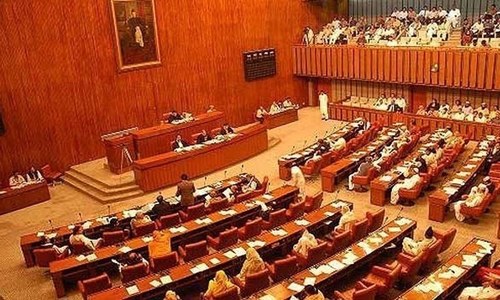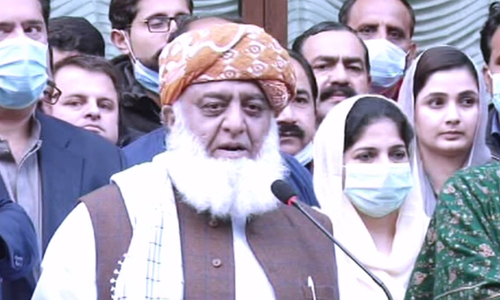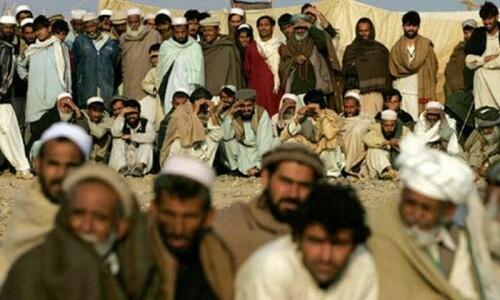ISLAMABAD: The federal government has decided to hold Senate elections in February and invoke advisory jurisdiction of the Supreme Court on open voting for the polls.
The decisions were taken by the cabinet which met here on Tuesday with Prime Minister Imran Khan in the chair.
During the meeting, Prime Minister Khan said legal reforms regarding the elections were meant only to make the entire process transparent and the doors were open for all political parties for talks in this respect.
The elections are to be held for 52 seats of the upper house because as many members of the 104-member Senate will retire on March 11.
Plans to seek apex court’s advice on open voting
Informed sources told Dawn that the proposal for early Senate elections was given by federal Minister for Science and Technology Fawad Chaudhry. When a participant of the meeting was asked if an amendment to the law would be required for it, he replied in the negative and said there was room in the law for it.
He referred to Article 224 (3) of the Constitution which reads: “An election to fill the seats in the Senate which are to become vacant on the expiration of the term of the members of the Senate shall be held not earlier than thirty days immediately preceding the day on which the vacancies are due to occur.”
However, he said the members elected before expiry of term of their predecessors will assume charge after March 3.
The proposal to seek the Supreme Court’s opinion under Article 186 of the Constitution was given by Attorney General Khalid Jawed Khan. Briefing the cabinet, he said if Section 122(6) of the Elections Act, 2017 was amended through an ordinance before the commencement of the election schedule by the Election Commission of Pakistan, the elections to the Senate could be held through open voting instead of secret ballot.
“However, keeping in view sensitivity of the matter and given the fact that there is sufficient time before next election to the Senate, the government may seek ‘clarity’ on the issue by filing a reference to the Supreme Court under Article 186 of the Constitution, he said. “This course is not necessary but as the matter is of utmost significance and would affect the functioning of the Senate, it may be prudent to seek the opinion of the Supreme Court,” he opined.
AG Khan said the Senate election was scheduled to be held in or about March 2021 to fill the seats as mentioned in Article 59 of the Constitution. The prime minister had made a public statement conveying the desire of his government to hold the elections by open ballot/show of hands as against secret balloting.
He said at present Section 122(6) of the Elections Act, 2017 provided for Senate elections by secret ballot. Article 226 of the Constitution provides that all elections under the Constitution other than those of prime minister and chief ministers ‘shall’ be held by secret ballot. Therefore, the AG said, unless the constitution was amended, the Senate election could not be held through open voting/show of hands.
However, Mr Khan said, contrary to this convocational understanding, there was another view which was that the Senate election was not an election under the Constitution. “It is held in terms of the provisions of the Elections Act, 2017. The elections under the Constitution to which Article 226 refers include the election of president of Pakistan under Article 41(3) read with Second Schedule to the Constitution. Likewise, the elections of speaker and deputy speaker of the National Assembly and chairman and deputy chairman of the Senate are elections held under the Constitution,” he opined.
He said Article 226 of the Constitution had been interpreted by different courts. The Sindh High Court (SHC) in the case of the MQM vs province of Sindh (PLD 2017 Sindh 169), following the earlier judgement of Balochistan High Court in the case of Attaullah vs government of Pakistan (PLD 2014 Balochistan 206) held that the local government elections were the polls under Article 226 of the Constitution and must be held by secret ballot. However, subsequently on an appeal against the SHC judgement, a three-member Supreme Court bench held that local government elections could be held through secret ballot or through show of hands and the choice was left to the legislature.
“However, the determining factor would be the provisions in the applicable statute at the time of commencing of the elections schedule,” the AG said.
He said while the Supreme Court judgement was a short order comprising four pages, no detailed reasons were recorded in that case and the three judges who had issued the short order had retired.
Briefing reporters after the cabinet meeting, Information Minister Shibli Faraz also said the government would approach the Supreme Court to seek its guidance regarding holding the Senate elections through show of hands.
He said since Senate elections tended to always become “controversial” and subject to horse-trading allegations, the government wanted the polls to be transparent and genuine.
A bill had been presented in the National Assembly in this regard on the basis of a Supreme Court short order and the cabinet discussed how the bill could be passed, the minister added.
Published in Dawn, December 16th, 2020

















































